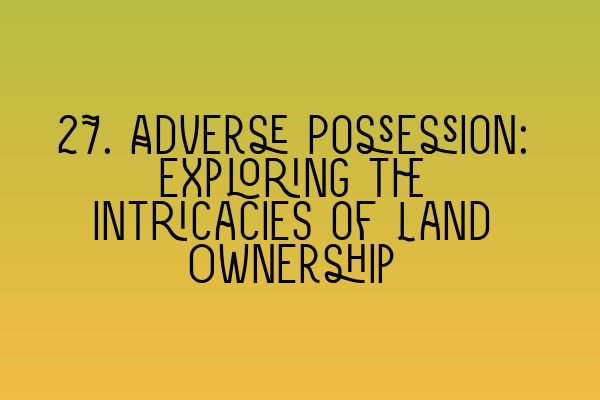**27. Adverse Possession: Exploring the Intricacies of Land Ownership**
Welcome to the latest blog post from SQE Property Law & Land Law. In this informative article, we will delve into the fascinating topic of adverse possession and uncover its intricacies in relation to land ownership. Whether you are a property enthusiast, a legal professional, or someone interested in the complexities of land law, this read is bound to increase your understanding and pique your interest. So, without further ado, let’s jump right in!
**What is Adverse Possession?**
Adverse possession is a legal concept that deals with the acquisition of property rights through continuous occupation without the permission of the legal owner. In simpler terms, it refers to the scenario where someone who is not the legal owner of a property can claim ownership after possessing it for a certain period of time.
It may seem counterintuitive that someone can become the rightful owner of a property by simply living on it without the owner’s consent, but adverse possession has a rich history ingrained in land law. The foundational principle behind this concept is that land should not remain dormant or unproductive, and occupying it and putting it to use may confer ownership.
**Key Elements of Adverse Possession**
To establish a claim of adverse possession, certain conditions need to be met. These include:
1. **Actual Possession**: The claimant must physically possess the land and have exclusive control over it. Merely having a legal interest or occasional use of the land would not be sufficient.
2. **Open and Notorious Possession**: The possession must be visible and obvious to anyone who might have an interest in the land. It should not be hidden or secretive.
3. **Hostile Possession**: The occupation must be against the interests or rights of the legal owner. In other words, the possession must be without the owner’s consent.
4. **Continuous Possession**: The possession must be uninterrupted and continuous for a specified period of time. The length of this period varies depending on the jurisdiction.
5. **Claim of Right**: The claimant must possess the land with the intention to assert ownership and treat it as their own.
**How Does Adverse Possession Impact Land Ownership?**
The primary effect of adverse possession is the potential transfer of land ownership from the legal owner to the adverse possessor. Once the requisite time period has passed and all necessary conditions are met, the adverse possessor can potentially gain legal title to the property. This can have significant consequences for the original owner, as they may lose their rights and control over the land.
However, it’s important to note that adverse possession is not an automatic process. The legal owner has the ability to defend their ownership by commencing legal proceedings, challenging the adverse possessor’s claim. This can involve proving that one or more of the key elements of adverse possession mentioned earlier are not satisfied. The outcome of such legal battles can vary depending on the specifics of each case and the jurisdiction in which it is heard.
**The Controversies Surrounding Adverse Possession**
Adverse possession is a topic that often stirs debates and controversies within the legal community and society as a whole. On one hand, it can be seen as a means of rewarding individuals who actively utilize abandoned or neglected land. It can incentivize the revitalization of derelict properties and promote productive use of land resources.
On the other hand, adverse possession can also be perceived as unjust, as it involves the transfer of property rights without the consent of the legal owner. It can lead to disputes and upheavals, especially in cases where the legal owner was unaware of the adverse possession claim.
**Conclusion and Next Steps**
Understanding the intricacies of land ownership, such as adverse possession, is essential for legal professionals and property enthusiasts alike. It sheds light on the complexities of property law and the nuanced balance between individuals’ rights and the interests of society.
If you found this article intriguing and wish to delve deeper into other areas of property law, we encourage you to explore our related articles on SQE 1 Practice Exam Questions, SQE 1 Practice Mocks FLK1 FLK2, SQE 2 Preparation Courses, SQE 1 Preparation Courses, and SRA SQE Exam Dates. These resources will provide you with further insights and help you navigate the dynamic world of property law with confidence.
Thank you for reading, and stay tuned for more engaging articles from SQE Property Law & Land Law.
